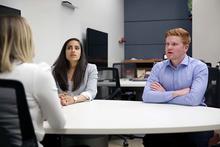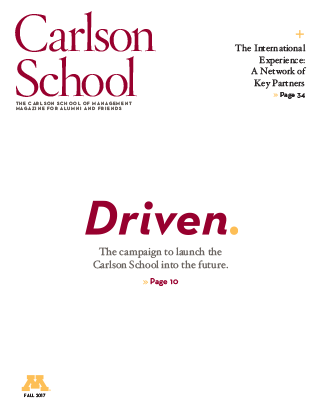
Carlson Consulting Enterprise Takes on Employment Challenges in North Minneapolis
Tuesday, September 19, 2017
The statistics are staggering.
Of the roughly 1,000 North Minneapolis families participating in programming through the collaborative nonprofit Northside Achievement Zone (NAZ), 73 percent earn $19,000 or less per year.
A quarter of North Minneapolis schoolchildren are either homeless or live in highly mobile conditions. Only 29 percent of the area’s entering kindergartners are deemed “ready to learn.”
If there is a ground zero for Minnesota’s struggles with educational and employment disparities, it could very well be North Minneapolis.
Four Carlson School students got an up-close look at some of the vexing, deep-rooted challenges facing North Minneapolis in a Carlson Consulting Enterprise (CCE) project for NAZ last spring.
“I had heard about poverty in the Twin Cities, but I guess not necessarily to the extent that is actually out there,” says Karl Breustedt, ’18 BSB. “When we went into the community and talked to all the community leaders, it was very eye-opening to see how certain members of the Twin Cities have really been left behind in terms of economic development.”
Changing that distressing reality is one of NAZ’s goals, which is what prompted it to enlist the help of the CCE through a grant from the McKnight Foundation.
“I’m usually reluctant to jump into student projects, because the work is really fast-paced and sometimes it takes more effort to get something out of it than we’re actually able to put in,” says NAZ Chief Operating Officer Michelle Martin. “But in this case, it felt as though we were hiring a consulting team to give us their best look at the problem and their best set of recommendations.”
NAZ takes a “two-generational approach,” Martin says, by collaborating with an array of partners to support education from early childhood to college while also helping those students’ families achieve living-wage employment and find stable housing. CCE’s charge was to identify ways to improve alignment between NAZ, its web of partner organizations, and Hennepin County on employment-assistance services.
“There are a lot of employment services that are provided in North Minneapolis, but they didn’t all work cohesively together in terms of getting candidates through that process efficiently, and our goal was really to identify where some of those gaps were and then provide recommendations for improving that process,” says Danielle Schmitz, ’17 MBA, the CCE team lead for the project.
Schmitz, Adriana Scheiner, ’17 MBA, and undergraduate students Breustedt and Daniel McKinney, ’18 BSB, undertook a largely qualitative study, interviewing personnel from a variety of organizations, a past program participant, and leaders from area nonprofits and Hennepin County. It led them to one overriding conclusion: All parties would benefit from utilizing an integrated case management model, which “would bring together all of these different organizations and provide a more holistic approach to the job seeker,” says Schmitz.
That recommendation provided the clarity for NAZ and Hennepin County to promptly map out a longer-term plan, says Martin.
“I think the way the proposal was put together spoke to the realities of the people leading the work as well as putting recommendations in that made a lot of sense and had action orientation,” she says. “It essentially teed up the action steps.”
“It allowed us to starting having the right conversations,” adds Danyika Leonard, NAZ’s family support strategy manager.
For the CCE students, the project provided a lesson in stakeholder management while also challenging them to break down a complex problem. According to Scheiner, it also offered a more tangible outcome than, say, the task of increasing a company’s bottom line.
“We could actually see who we were affecting,” she says.

